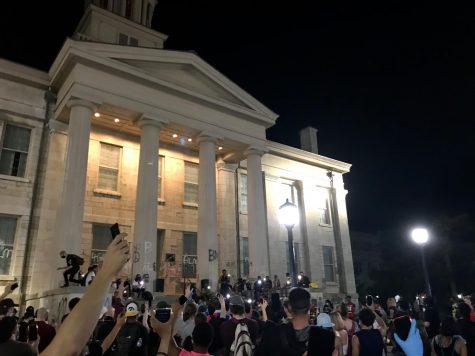Your donation will support the student journalists of Iowa City High School. For 2023, we are trying to update our video and photo studio, purchase new cameras and attend journalism conferences.
Part Two: City Council
October 23, 2020
Mazahir Salih was outraged with the lack of representation in the Iowa City Council. She became determined to fix the everyday problems she saw on a city level.
“Through my work with low wage workers and people who are constantly left out, people who were never given a chance to have a seat at the table, I found out there is a big disconnect between the people who make policy and vulnerable people in the community,” Salih said. “But if given a chance they can bring really creative solutions as well.”
She soon began campaigning for a seat on the council. In January of 2018, Salih started her first term as a Mayor Pro Tempore, making her the first Sudanese American to be elected into public office in the United States.
“Even though being the first is sometimes sad, it also makes me happy that at least we’re breaking the barrier. This is a step moving forward for immigrant people, to become a role model,” Salih said.
When the protests began, Salih was put in a difficult position. Being one of two members of color on the council, she was put on the spotlight by both parties.
“It was hard, I had been expected to make the policy and at the same time, people expect me to also lead the movement. Wearing those two different hats was very difficult for me because this is my movement as a Black woman,” Salih said. “I’m grieving, and really sad about what’s going on in the country.”

She soon decided to use her voice to help the Black community.
“I said, ‘Okay, this is my time. If I cannot make a change at the city level as a Black woman, what [else] do I have to focus on?’” Salih explained. “This is the time the people who look like me, need me, because I’m the policymaker. That’s why I was really fighting hard for Black Lives Matter.”
Salih is also a mother of five, and her kids were heavily involved with the Black Lives Matter protests throughout Iowa City.
“As a mom, I would be worried about [my child’s] life, but at the same time, I believe in Black Lives Matter, that we cannot be silent anymore. It is past time for this. That gives me the power to say yes, we need to do this and try to support them as much as we can,” Salih said.
In addition to speaking at multiple protests, Salih worked to implement the Iowa Freedom Riders demands. In order to pass a demand, the council needs to have a majority vote.
Salih described the difficulty of enacting policy on a City Council level. “At the end of the day I am only one vote. You can tell how I’m passionate about it while I’m fighting for it.”
The City Council implemented the Black Lives Matter and Systemic Racism Resolution in June of 2020. This plan includes seventeen actions that the city will make in attempts to combat systemic racism in the community including a preliminary plan to restructure the Iowa City Police Department to community policing, banning the use of chokeholds, and putting 1,000,000 dollars towards promoting social justice and racial equality. More information can be found on the Iowa City Government website.
Part of the City Council’s work towards ending systemic racism is the Truth and Reconciliation Commission. Hamad, who is a human rights major at Columbia University, has researched the subject which is often brought up in human rights conversations.
“They’re basically forums in which communities can recognize the injustices that have been happening in their own communities, and move past them,” Hamad said.
Iowa Freedom Riders are a part of the voices represented on the commission. However, even with the Truth and Reconciliation Commission, Hamad is still disappointed with the lack of progress the City Council has made.
“The progress has really been slow. They’re always going to be like, ‘Oh yeah, change is slow,’” Hamad said. “It’s really disheartening to see how slow the progress is when the council is sitting there saying that ‘Black lives matter to us and we’re trying. We’re committed to making change.’ But in actual terms of results, there really hasn’t been anything that’s been done.”
Hamad feels that the commission isn’t being fully operated correctly.
“It’s kind of disappointing to see, to me personally it feels a little performative,” Hamad said.
The commission will collect evidence and testimony from community members’ experiences with racial injustice, and then there will be the opportunity for facilitated conversation to discuss these experiences.
“There is more that needs to be done,” Salih said. “I want to see the police treating people of color and Black people in this community, the same way that they treat white people in this community. And I want to see Black people being represented. I want to see city education that looks like the community. Leaders that look like the community, school teachers that look like the community.”